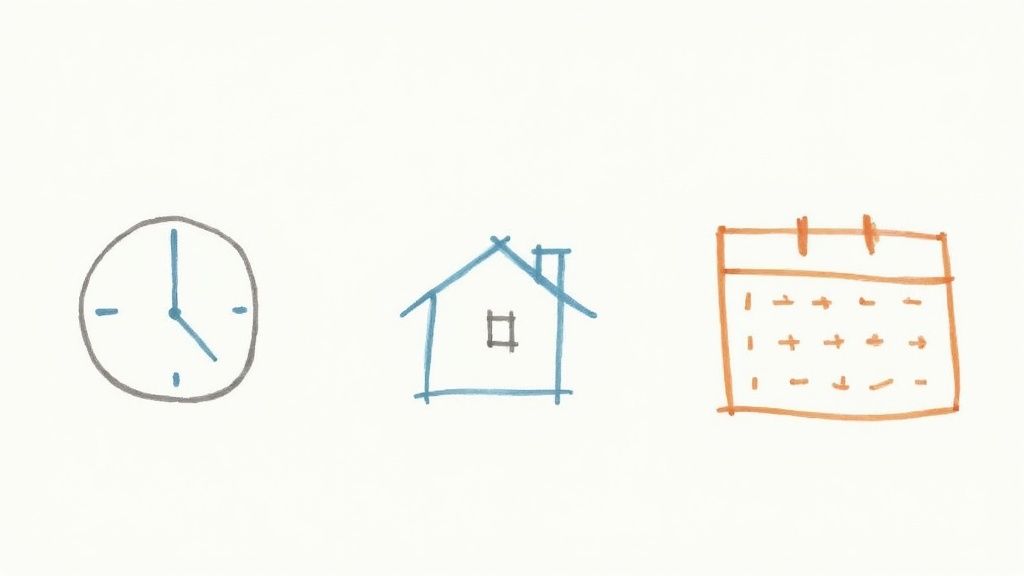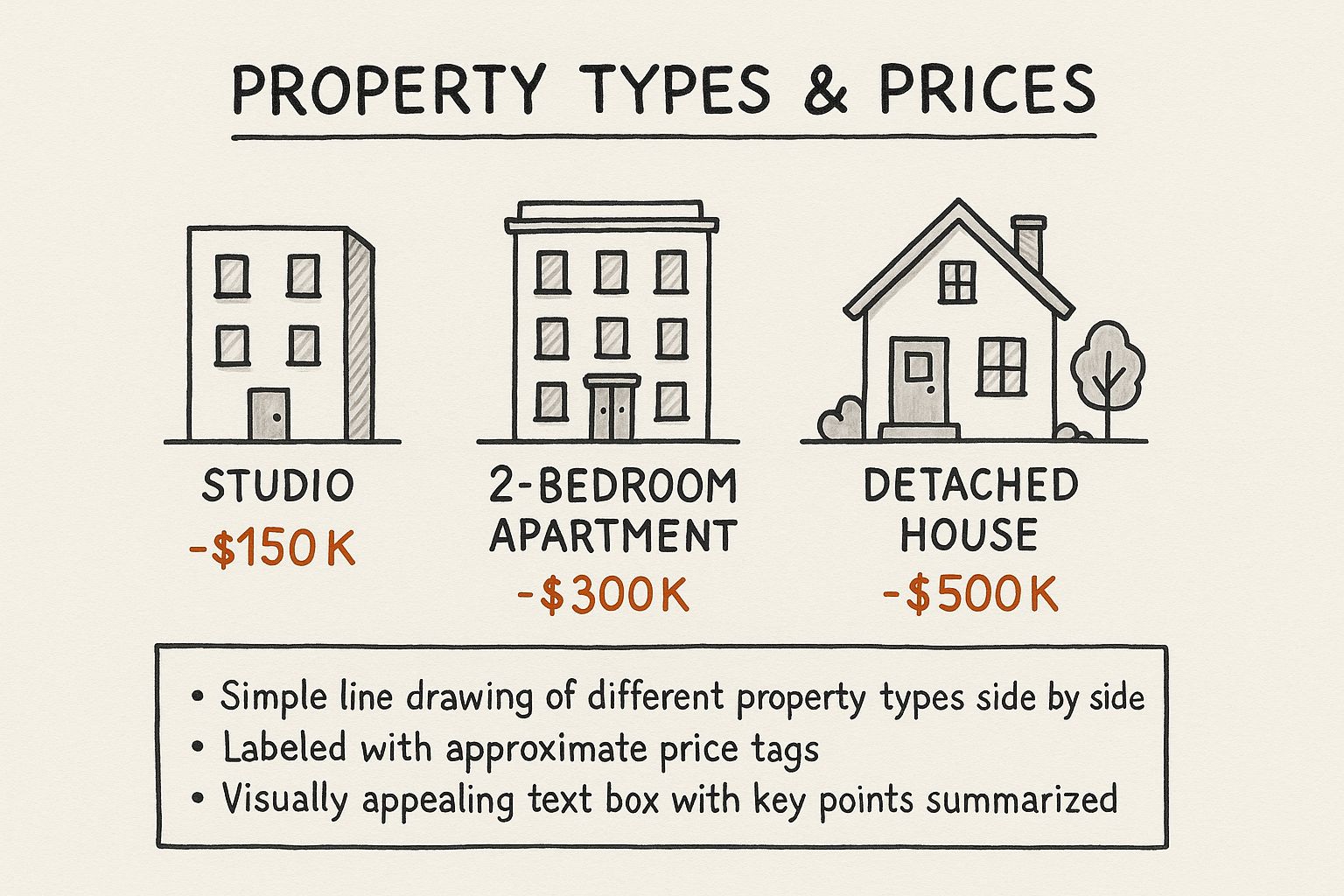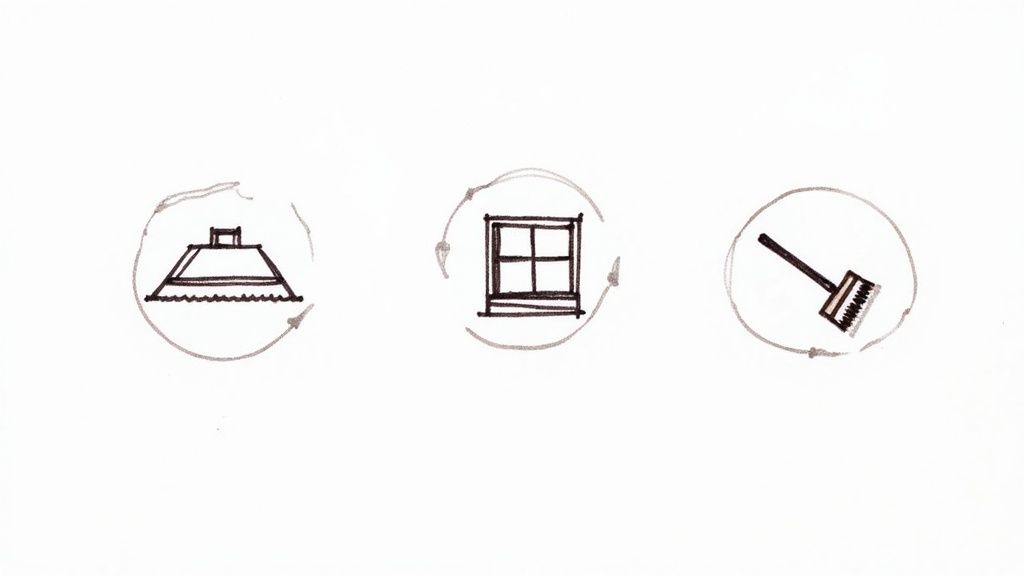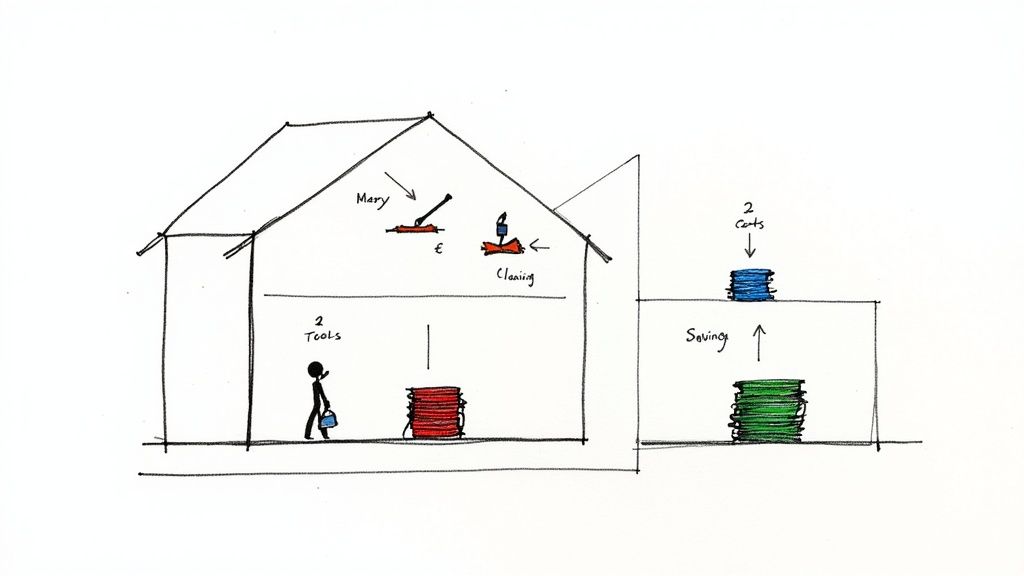So, what's the going rate for a professional cleaner in the UK? Let's get straight to it.
On average, you can expect to pay somewhere between £15 and £25 per hour for a professional cleaning service. If you're looking at a standard clean for a typical three-bedroom house, your budget should be in the ballpark of £45 to £75. For a more thorough, top-to-bottom deep clean, that figure could easily jump to £150 or more.
Breaking Down the Average Cleaning Costs
Think of those average costs as a starting point, not a fixed price. They're a useful benchmark, but the final quote you receive will hinge on several key factors. It's a bit like buying a car—the base price is one thing, but the final cost depends on the extras and specifications you choose.
At the heart of the cost is, of course, the labour. The wages for experienced cleaning professionals in the UK typically sit between £14 and £18 per hour, influenced by their skill level and location. This wage forms the foundation of the price you're quoted.
A Quick Guide to Estimated Costs
To help you get a clearer picture, let's break down how the type of clean and the size of your property affect the final bill. A quick weekly tidy-up is naturally going to be lighter on the wallet than a comprehensive end-of-tenancy clean, where every nook and cranny gets attention.
Your location also makes a big difference. Unsurprisingly, costs in major cities can be higher than in smaller towns. If you're searching for cleaning services in Oxford and the surrounding areas, it’s always a good idea to get a quote tailored to your specific needs.
You'll mainly come across two types of services: a standard clean and a deep clean. A standard clean handles all the regular jobs like dusting, vacuuming, and wiping down surfaces. A deep clean goes much further, tackling the inside of the oven, getting behind appliances, and giving bathrooms a detailed scrub.
To make things even clearer, here’s a quick summary of what you might expect to pay.
Estimated UK Cleaning Service Costs At a Glance
This table gives you a snapshot of typical costs based on the service you need and the size of your home. Use it as a quick reference when planning your budget.
| Service Type | Average Hourly Rate | Estimated Cost for a 3-Bed House |
|---|---|---|
| Standard Clean | £15 – £20 | £45 – £60 |
| Deep Clean | £20 – £25+ | £120 – £200+ |
As you can see, the difference between a routine tidy and an intensive deep clean is significant, both in the work involved and the final price.
What Actually Determines Cleaning Service Prices?

Ever got two wildly different quotes for cleaning the same house and been left scratching your head? It happens. The final cost of a cleaning service isn't just a number plucked from thin air; it’s a careful calculation based on several moving parts. Knowing what these are helps you see exactly what you're paying for and why the price is what it is.
The biggest factor, as you might guess, is the size of your property. A one-bedroom flat is a much quicker job than a sprawling four-bedroom house. More rooms, more bathrooms, and more floor space all add up to more time and effort, which is the core of any cleaning quote.
But size is only half the story. The actual condition of your home is just as important. A home that gets a regular once-over is a completely different beast to one that's been neglected for a few months.
Property Size and Condition
Picture this: you have two identical four-bedroom houses. One is tidy, but the other has layers of dust, stubborn grease on the kitchen cabinets, and heavy limescale in the showers. That second house is going to require a lot more elbow grease and time to bring it up to standard.
This is why any reputable cleaning service will either want to do an in-person visit or ask you a lot of questions before giving you a firm price. A cleaner might have to spend double the time on a bathroom with heavy soap scum compared to one that's wiped down regularly, and that extra labour has to be factored into the quote.
The Type of Clean You Choose
Not all cleaning is created equal, and the service you book will have a huge impact on the price. Most services fall into two main camps: standard cleans and deep cleans. A simple analogy makes the difference clear.
-
A Standard Clean: Think of this as your regular maintenance wash for your car. It’s designed to keep things ticking over nicely and looking fresh. It covers all the basics – dusting, vacuuming, wiping down surfaces, and giving the kitchen and bathrooms a good clean.
-
A Deep Clean: Now, this is the full detailing service. It goes way beyond the surface to tackle all the built-up grime in places that aren't part of a weekly touch-up. We're talking about scrubbing the inside of the oven, cleaning behind the fridge, descaling shower heads, and washing down all the skirting boards.
A deep clean is far more labour-intensive and takes much longer, which is why it costs a fair bit more than a standard service. It's the perfect choice for a first-time clean to set a new standard, or as a proper seasonal blitz a couple of times a year.
Frequency and Other Little Details
How often the cleaners visit also plays a part. Most companies will offer a better rate for regular, scheduled cleans. A weekly or fortnightly service usually costs less per visit than a one-off job because less dirt has a chance to build up, making each clean quicker and more predictable.
Finally, a few other things can nudge the price up or down:
-
Your Location: Just like with many services, your postcode can matter. Operating costs can be higher in the city centre compared to the suburbs, which might be reflected in the rates.
-
Supplies and Equipment: Does the cleaner bring everything with them, or do they use your products? A service that provides all its own professional-grade supplies and equipment will naturally factor that convenience into their price.
-
Special Requests: Need your inside windows polished? Laundry folded? Or the carpets given a proper shampoo? These are all add-on services that will increase the final bill.
Once you get a handle on these key drivers, you can look at any quote and see how it all adds up. It gives you the power to choose a service that truly reflects the work your home needs to sparkle.
How Cleaning Companies Charge for Their Services
Ever wondered how cleaning companies come up with their quotes? It’s not always as simple as a single price tag. Understanding the different ways they structure their fees is the first step to finding a service that truly fits your needs and your budget. Let’s break down the common pricing models so you can compare quotes like a pro and avoid any nasty surprises down the line.
The most familiar method is the hourly rate. It's straightforward: you pay for the time a cleaner is actively working in your home. This approach is brilliant for its flexibility, especially if your cleaning needs change from one visit to the next. One week might be a standard spruce-up, while the next you might need an extra hour dedicated to the kitchen after a big family get-together.
Of course, that flexibility can be a double-edged sword. If a clean takes longer than you budgeted for, the final bill can creep up, making it a bit tricky to manage financially.
Flat Rate and Per-Project Pricing
On the other side of the coin, you have the flat-rate pricing model. With this, you're given a single, fixed price for a specific, well-defined job. Think of things like an end-of-tenancy clean or a one-off deep spring clean where the scope of work is clear from the outset. The biggest win here? Predictability. You know exactly what you’ll pay before a single cloth is lifted.
For particularly large or unique properties, some companies might price per-room or per-square-foot. This isn't as common for regular domestic cleaning but often comes into play for commercial spaces or sprawling homes. It helps create a standard for quoting, but you'll want to get crystal clear on what's actually included in that "per-room" fee.
The image below gives a great visual on how these different models stack up against various property sizes.

As you can see, the bigger the home, the more the choice between hourly and flat-rate pricing can impact your wallet.
Choosing the right model is all about balancing cost certainty with flexibility. A flat rate gives you peace of mind for those big, one-off jobs, while an hourly rate can be more efficient for regular, consistent cleaning.
Choosing the Best Pricing Model for You
So, which one is right for you? To make it easier, it helps to see the different models laid out side-by-side. Each has its own distinct advantages and potential downsides depending on your situation. Think about what's most important to you: is it a predictable budget, the flexibility to add tasks, or just a simple, one-off price?
Here's a table that breaks down the pros and cons to help guide your decision.
Comparing Cleaning Service Pricing Models
| Pricing Model | Best For | Pros | Cons |
|---|---|---|---|
| Hourly Rate | Regular maintenance and jobs where your needs might vary. | Flexible; you only pay for the time worked. Perfect for custom cleaning requests. | The final cost can be unpredictable if a clean takes longer than planned. |
| Flat Rate | One-off deep cleans or end-of-tenancy services with a clear scope. | Predictable cost; you know the exact price upfront. No surprises on your invoice. | Might be less cost-effective if the job is done quickly. Not as flexible for add-on tasks. |
| Per Square Foot | Very large homes or commercial properties. | Provides a standardised price that’s easy to compare across big spaces. | Less common for standard domestic cleans. May not account for the property's condition. |
Ultimately, the best companies will be transparent about their pricing structure and help you understand why they recommend a particular model for your home. Don't be afraid to ask questions
Comparing Home and Business Cleaning Costs

On the surface, cleaning a house and cleaning an office might seem like the same job. But in reality, they're worlds apart. It’s no surprise, then, that the cost of a cleaning service for a business is usually a fair bit higher than for a home, and for very good reasons.
First off, there's the sheer scale of it all. Picture a busy office building or a sprawling retail shop versus a typical three-bedroom house. The larger square footage alone means more time, more hands on deck, and a whole lot more cleaning supplies.
But it’s not just about size; the entire purpose of the clean is different. While a domestic clean is about making a home feel comfortable and tidy, a commercial clean has to tick boxes for health, safety, and professional presentation.
Specialised Needs of Commercial Spaces
Business premises often need a much deeper level of sanitation. This is especially true for places like medical clinics, kitchens, or nurseries, where hygiene isn't just a nice-to-have—it's a legal necessity. Cleaners need to be equipped with specialised, powerful cleaning agents and often have training in things like infection control.
On top of that, commercial jobs demand equipment you just wouldn't find in a domestic cleaner's toolkit. We’re talking about things like:
- Industrial floor polishers for keeping large reception areas or hallways gleaming.
- Commercial-grade carpet cleaners built to tackle heavy, constant footfall.
- High-performance vacuums that are tough enough for daily, rigorous use.
The cost of buying and maintaining this kind of professional gear naturally gets factored into the service price, pushing it above what you'd pay for a standard home clean.
The core difference really comes down to the goal. Home cleaning is all about personal comfort. Commercial cleaning is about protecting a company’s image, keeping staff safe, and meeting public health standards.
Contracts and Working Hours
Another major point of difference is the way the work is arranged and paid for. You might book a home cleaner for a couple of hours here and there, paying as you go. Commercial cleaning, on the other hand, almost always runs on long-term contracts, whether that's monthly or annually, to ensure the business gets reliable, consistent service.
These contracts often specify that cleaning has to happen outside of normal working hours—think evenings, nights, or weekends—to avoid getting in the way of staff and customers. This out-of-hours work naturally comes at a premium labour rate, which also affects the final price.
This demand is only growing. The UK cleaning industry is set to expand, with a projected compound annual growth rate of around 9% between 2025 and 2030, largely thanks to the commercial and healthcare sectors. If you're interested in the numbers, you can get more details on these market trends and dig into the full research.
Understanding the Hidden Costs and True Value
The first quote you get for a cleaning service is a great starting point, but it's rarely the full story of the cost of a cleaning service. To really know what you’re signing up for, it’s wise to look beyond that initial figure and understand what else might be involved—and the incredible value you get for your money.
What might seem like 'hidden' costs are often just optional add-ons or standard business necessities. Knowing what they are from the outset means no nasty surprises when the invoice arrives.
Looking Beyond the Base Price
A professional cleaning company has the same running costs as any other proper business, and some of these will naturally find their way onto your bill. It’s all about transparency.
Here’s what you might see itemised on your quote:
- VAT: Any company that is VAT-registered has to add this tax by law. It’s typically 20% on top of the service fee.
- Eco-Friendly Products: If you prefer non-toxic or environmentally friendly cleaning solutions, there might be a small extra charge. These products simply cost more for the company to buy.
- Insurance Fees: A good, reputable company will always have comprehensive liability insurance. This cost is usually absorbed into the main price, but some may list it as a small administrative fee.
These aren't sneaky charges designed to catch you out. They're just part of what it takes to run a professional, fully insured, and compliant business. A transparent company will have no problem explaining every single line on your quote.
Seeing the full cost isn't just about spotting extra fees. It’s about recognising what you’re paying for—professionalism, security, and a higher standard of clean that’s difficult to achieve on your own.
The Real Value of Professional Cleaning
Hiring a cleaner isn’t just paying for a service; it's an investment in your own time and well-being. The single biggest return is getting your precious hours back. Think about it—instead of dedicating your weekend to scrubbing floors, you free up that time for family, hobbies, or just putting your feet up.
What's more, professional cleaners don't just show up with a bottle of spray and a cloth. They come equipped with industrial-grade equipment and specialised products that are worlds away from what you'd find in a supermarket. They have the right tools and, crucially, the know-how to deal with tough grime, delivering a clean that’s not just better but lasts longer too.
If you’ve ever battled a particularly nasty mark, you’ll know the difference an expert can make. While our guide on how to remove stubborn stains has some great tips, a professional brings the experience to get it done quickly and safely.
Ultimately, you’re also paying for peace of mind. Knowing that a fully vetted, trained, and insured team is looking after your home is invaluable. You get to enjoy a spotless space without any of the work, stress, or worry.
How to Get the Best Value for Your Money
Getting a great deal on a cleaning service isn’t just about hunting for the lowest price. It's about making sure every pound you spend works as hard as possible to give you a sparkling home. With a few clever strategies, you can keep your space immaculate without breaking the bank.
One of the easiest things you can do is to declutter before your cleaner arrives. Every minute they spend picking up toys or stacking mail is a minute not spent on the deep-cleaning jobs you hired them for, like scrubbing tiles or polishing taps. A quick 15-minute tidy-up means their time is spent where it really matters.
Be Strategic with Services and Scheduling
Think about bundling services to get more for your money. If you know you'll need your oven cleaned and your windows washed in the near future, ask if you can get a discount for booking them at the same time as your regular clean. Many companies are happy to offer a better deal for a larger job.
Likewise, setting up a regular cleaning schedule almost always works out cheaper per visit. A weekly or fortnightly clean is less intensive than a one-off deep clean, so the price reflects that. The consistency allows the cleaners to maintain a high standard efficiently, and you reap the savings.
A long-term commitment makes you a valuable customer. Don't be shy about asking for a better rate if you're willing to sign up for a six-month or year-long schedule. It often gives you a bit more negotiating power.
Do Your Homework to Find the Right Fit
The UK cleaning industry is huge—it was valued at around £59.8 billion in 2021. But with many firms struggling to find staff, a reliable service can feel like a rare find. That's why it pays to do a little digging. You can read more about the UK cleaning industry's landscape on policybee.co.uk.
Always aim to get at least three quotes from different local companies. This will give you a solid idea of the going rate in your area and help you spot any prices that seem too high or too good to be true. When you compare, look past the numbers and check recent online reviews to see what real customers are saying about their quality and dependability.
Finally, good communication is everything. Be completely clear about what you need done and what your budget is. A professional company will listen and work with you to create a plan that gives you exactly what you're looking for.
If you're ready to find a service that ticks all the boxes, you can get a transparent quote and book online in just a couple of minutes.
Your Questions Answered
When you're looking into professional cleaning, a few common questions always pop up. Here are some straightforward answers to help you out.
Do I Need to Provide My Own Cleaning Supplies?
This really comes down to who you hire. Most professional cleaning companies will arrive with their own arsenal of high-quality, professional-grade supplies and equipment. The cost for this is typically built into their price, which saves you the hassle.
On the other hand, some independent cleaners might offer a slightly lower rate if you’d prefer they use your products. It's always best to ask this question upfront when getting a quote so there are no surprises.
Is It Cheaper to Hire an Independent Cleaner?
On paper, yes, an independent cleaner often looks cheaper. They don't have the same overheads as a larger company, so their hourly rates are usually more competitive.
However, there's a trade-off to consider. A reputable company invests in things like comprehensive insurance, thorough background checks for all staff, and will have backup cleaners ready if your regular one is ill or on holiday. That slightly higher cost of a cleaning service from a company is really an investment in reliability and peace of mind.
Should I Tip My Cleaner in the UK?
Unlike in some other countries, tipping isn't a standard, expected part of the service for regular cleaning here in the UK. That said, it's always a welcome gesture for a job well done.
If you have a regular cleaner who you're really happy with, a small tip every now and then or a Christmas bonus is a lovely way to show your appreciation. For a one-off deep clean, a tip is a nice way to say thanks for the extra effort, but it's certainly not required.
Ready for a spotless home without the hassle? Signal Cleaning offers transparent pricing and easy online booking for professional cleaning services in Oxford. Get your instant quote today!

Leave a Reply